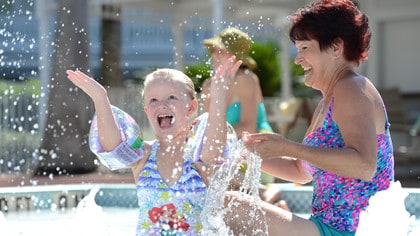There’s really no way around it. If you are active during the summer months or around water, moisture is one of the major reasons hearing aids are sent to the manufacturer for repair service.
If you know you’ll be immersed in water, remove your hearing devices and store them in a safe, dry place. Consider keeping a variety of small, waterproof containers on hand for the season. Look for these containers, in a variety of shapes, colors and sizes, in the water sports department of sporting goods stores. They’re inexpensive so you can buy several to keep in the car, the boat, at the lake, or wherever you may find yourself in a wet situation. In a pinch, try using a zippered plastic baggie. They aren’t always completely water tight, but they may keep your hearing aids dry enough in an emergency situation.
Many of us like to work outside or in our garden during the summer months. Excessive perspiration can be a problem for hearing devices. Consider purchasing a set of EarGear. These are sleeves that fit over the behind the ear portion of your hearing devices. Kind of like a protective sock, they are made of water resistant spandex nylon. The sleeve protects the hearing device amplifier, case, controls and battery compartment from moisture and other environmental elements, while still allowing sound to enter the microphones. We have recommended EarGear for many of our patients and would be happy to order a set for you. However, at times it may be best to leave our new ears in the house, if you are going to get really hot, dirty and sweaty.
If you’ll be playing around water – but not in it – consider purchasing a set of EarGear. Although these sleeves won’t protect your hearing devices if completely immersed in water, they will help minimize the damage from the misdirected stream from your grandson’s water gun or an unexpected splash at the pool.
Even if you’re as careful as can be, there’s always the possibility that you’ll accidentally drop your hearing devices in the bathroom sink or jump into the pool without remembering to remove them first. If this happens, don’t panic. Take them out of the water immediately and dry them off as quickly as possible. Remove the batteries and dry the battery compartment. Put them into a hearing aid dryer – also known as a dehumidifier – and let them dry overnight. We stock Dry & Store Dehumidifiers and Dry Caddys in our office, so feel free to stop in and see what may work best for you.
If you would like to make an appointment to further discuss your hearing healthcare needs, give Beth or Jamie a call at (704) 212-2376 to schedule an appointment. Be sure to visit our website at www.hearingsolutionsofnc.com. Jane and I look forward to seeing you soon.

